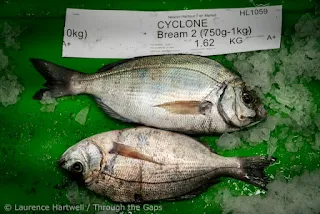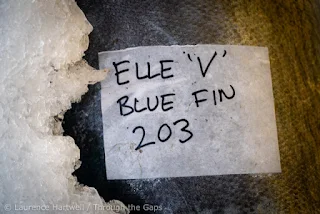End to end with boxes of fish on the first #FishyFriday auction of the month...
with a good run of hake landed by the netters Ocean pride...
and plenty of mixed fish from the trawler Crystal Sea...
and some cracking reds from inshore boats like the Alfie May...
and a good selection of bream species including these black bream...
and these two, one of which is a pink bream, the other a Couch's, but which is which?..
though this guy is definitely not a black bream...
always good to see these guys drop on the deck from the cod end...
and monk too...
if I were a rich man, if you're old enough you'll know...
exceptionally good mackerel fishing in St Ives Bay at the moment...
which may explain why there are still good numbers of blue fin being landed...
the biggest weighing in at just over 200kg...
and the smallest at 54kg...
young Mr Pascoe also pulled a few bass from the depths, despite being surrounded by schools of bluefin - mist of them youngsters chasing small fish in the Bay...
always a challenge laying out an inshore boat's trip when they landed a handful or even just a single example of fish per species...
young Dan the sardine man heads back to his berth...
his night's work proving a source of frustration for this young gull who can smell tons of sardines below his feet for breakfast but just can't quite figure out how to get to them...
much of the fleet are between trips...
there are now a number of signboards gong up around the harbour informing the public of how Newlyn is at a crucial crossroads, the size of the boats and the increase in demand and complexity of shoreside support will necessitate the development of the port in order to service the need.






















































